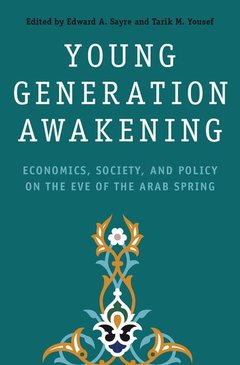Description
Young Generation Awakening
Economics, Society, and Policy on the Eve of the Arab Spring
Coordinators: Sayre Edward A., Yousef Tarik M.
Language: English
Subjects for Young Generation Awakening:
Publication date: 08-2016
264 p. · 16.3x24.4 cm · Hardback
264 p. · 16.3x24.4 cm · Hardback
Description
/li>Biography
/li>
The street protests that erupted in Tunisia in December 2010 and spread quickly throughout the Middle East surprised not only the entrenched dictators of the region but also international observers who collectively had taken for granted the durability of Middle Eastern authoritarianism. Specifically, the Arab Spring uprisings debunked the prevailing notion that youth were disengaged from political life by their economic exclusion and tight regime control of their mobilization. Indeed, the one consistent feature across the uprisings, whether peaceful or violent, was the key role played by young people. What has remained unclear is why youth became the vanguards of the Arab Spring protests and why they have not played a more prominent role in the transitions that followed. To address these questions, the authors in this volume use updated data sets on demography, employment, education, inequality, social media and public sentiment to examine the underlying socioeconomic conditions of young people in the Middle East at the time of the uprisings and offer a mosaic of analytical explanations linking those conditions from 2009-2011 to the revolts of 2010-2012. The findings in the volume confirm the inadequacy of traditional narrow explanations rooted in demographic profiles, economic grievances or political exclusion in accounting for the complex socioeconomic dynamics facing youth and societies at large in the Middle East in the period leading up to the Arab Spring. The contributors emphasize the fundamental institutional rigidities in the region's policy space and evaluate potential approaches to policy reform that can promote youth inclusion and help transform the region's political economies in the post Arab Spring environment of persistent economic volatility, social unrest and political instability.
Dr. Edward A. Sayre is an associate professor of Economics and Chair of the Department of Political Science, International Development, and International Affairs at the University of Southern Mississippi (USM). Dr. Sayre's research focuses on the economics of the Palestinian-Israeli conflict, labor market institutions, and Middle East labor markets. Before starting his current position at USM, Sayre was a visiting research associate at the Palestine Economic Policy Research Institute (MAS) in Jerusalem and taught at Kenyon College and Agnes Scott College. Since 1999 Dr. Sayre has served on the Board of Directors the Middle East Economic Association. Dr. Tarik M, Yousef is Senior Fellow at Brookings who served between 2011 and 2015 as Chief Executive Officer at Silatech, a regional organization promoting youth employment in the Arab world. Prior to that he served as Sheikh Al-Sabah Professor of Arab Studies in the School of Foreign Service at Georgetown University and Founding Dean of the Dubai School of Government. He is at present a member of the Boards of Directors of the Arab Banking Corporation and the Central Bank of Libya.
© 2024 LAVOISIER S.A.S.




